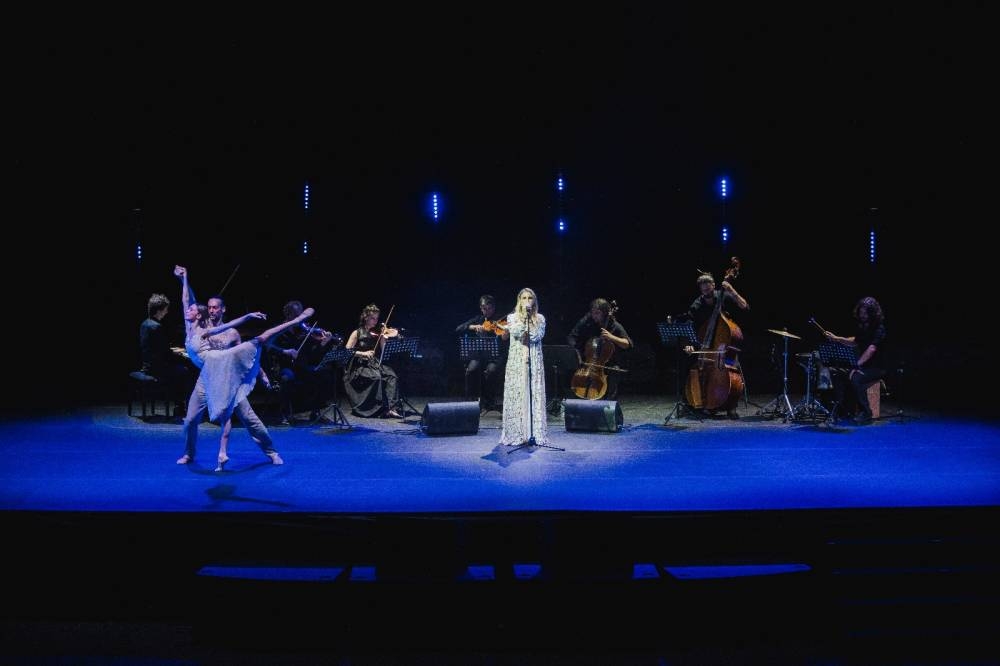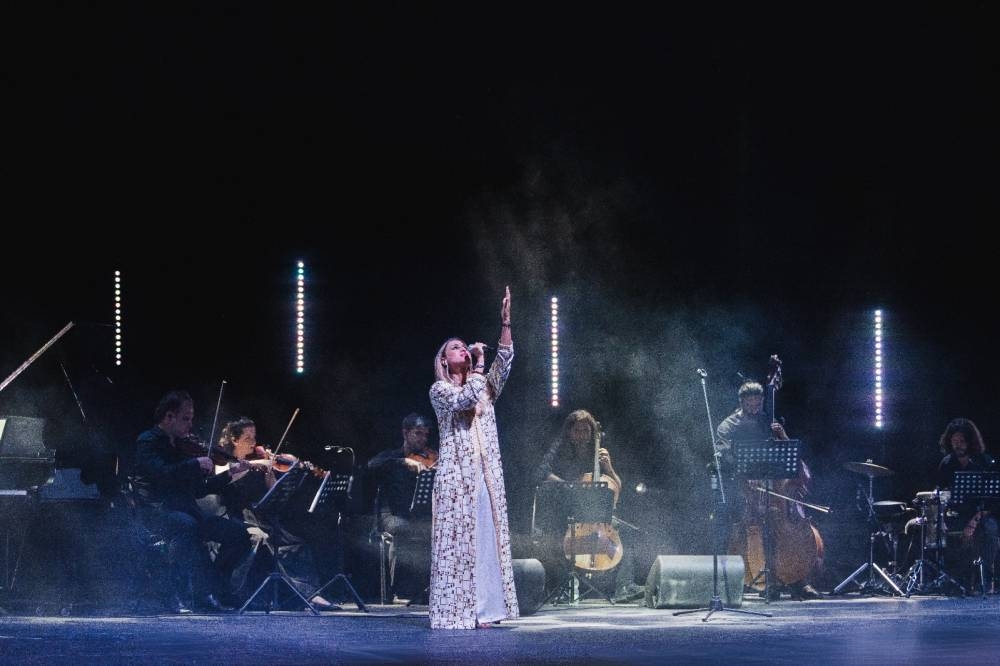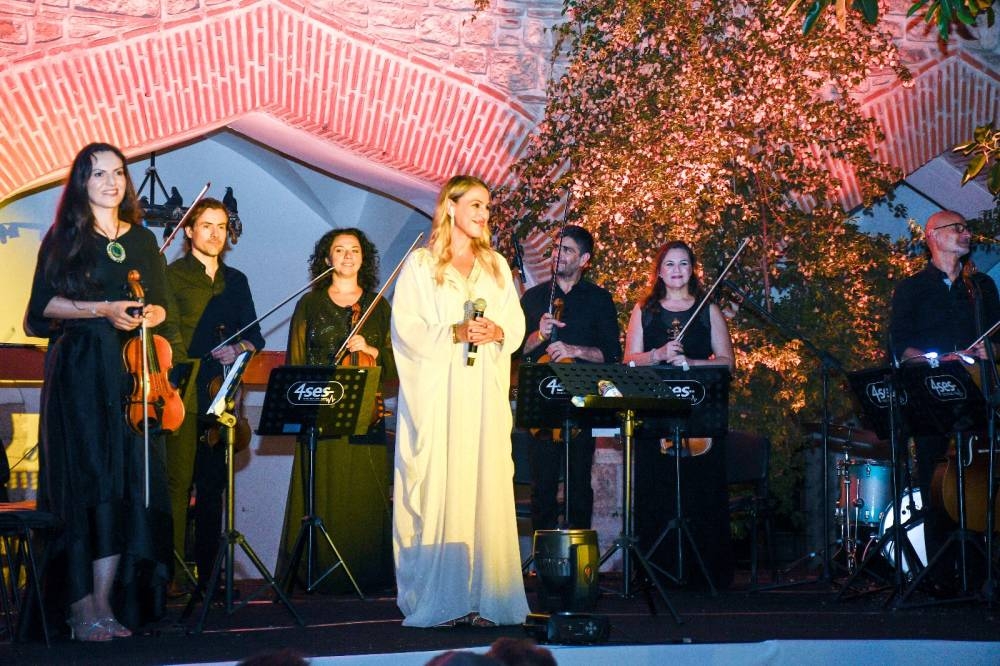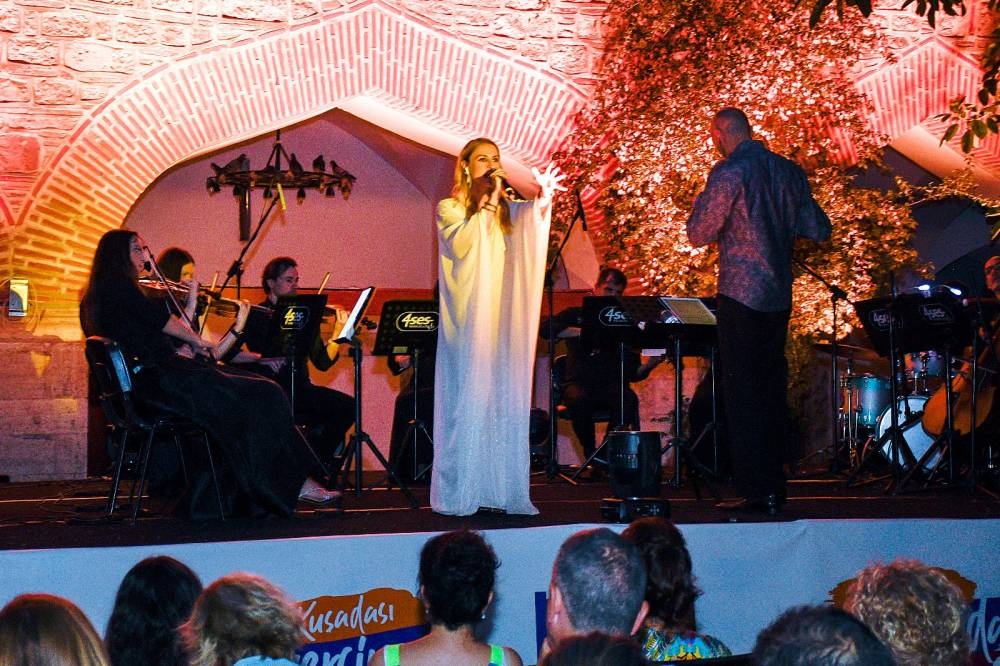Dana’s performance, featuring musicians from the Qatar Philharmonic Orchestra and the La Filharmonie - Filarmonica de Firenze, followed her groundbreaking appearance as the first Gulf musician to perform at the Trophée Chopard Gala during the 77th Cannes Film Festival in May. With these milestones, she expanded her flourishing presence across Europe, cementing her status as a leading voice in contemporary musical expression.
In an exclusive interview with Gulf Times, Dana discussed her recent performances, her career trajectory, and her plans to continue pushing the boundaries of musical expression.
Can you tell us something about the onset of your music career and some major milestones and achievements?
Dana: It’s been 10 years; there's a lot to talk about, but if I can just focus on the recent period. This period saw the birth of my new project ‘Indigo,’ ‘Rumi,’ my upcoming album ‘Tempest,’ and it's been a wonderful period that allowed this body of work to travel around the world. The latest stop for Indigo was the Cannes Film Festival, which was a wonderful and important part of my career, given that I’m the first artist and composer from this region to perform at that event.
It’s extremely important because it’s a global stage. It offers immense exposure, not only to the audience but in terms of press reach. Representing my region, it was a huge responsibility that I took with great care and attention.
This is the first time an artist from the Gulf region performed at the Teatro Romano di Fiesole. How do you feel about this historic milestone, and what significance does it hold for you and your career?
Dana: Florence is hugely significant in the history of human cultural progress, so contributing in my way to this rich history of cultural development and expansion is a huge achievement. Cultural intermingling and sharing ideas are vital for development. This performance added another voice, texture, and sound from another part of the world to Florence's rich history. I’m a huge fan of history, and Florence is dear to me because of that. I couldn’t wait to go on more historical tours with my daughter before the concert.
You have performed in various prestigious venues across Europe. How do these different settings influence your performances?
Dana: That's an amazing question, and it resonates deeply with my experiences when traveling to new places and performing in new settings. Each time I visit a new location, there's a fresh dialogue between myself and the place. There's an energy, an exchange that occurs, whether we recognize it or not.
As a writer, you might find that your surroundings influence your writing. As a singer, you might find inspiration in the new environment. For me, as a composer, the first thing I do is go to a piano and play whatever comes to mind. I did this when I was in Florence, and it was fascinating to see the influence of the place in my music.
I often create impromptu compositions on the piano, just to see what emerges. This practice shows me how much I absorb from my surroundings. We don’t always realize how much we take in until we express it. My medium is the piano, and when I sit down to play, I sometimes create music that sounds completely different from my usual style, reflecting the influence of the new environment.
Everyone has their own way of expressing their interactions with new places. Nothing exists in isolation; everything is interconnected. When we express ourselves, we realize just how much we have absorbed from each place we've visited. My work reflects this absorption, as you can hear a strong influence of global cultural traditions in my music. This happens because I am very aware of and responsive to the energetic exchanges and interactions I have with different places and cultures.
As an artist from the Gulf region making waves in Europe, how do you see your role in representing your culture and bridging the gap between East and West through music?
Dana: It’s always been a very important direction for me—the conscious pursuit of connectivity through music. Everything I've done in my career over the past 10 years has aimed to highlight cultural exchange and the role of music in illustrating our similarities and demonstrating how much we can learn from our differences. This approach integrates the full spectrum of the human experience into my musical conversations.
When I refer to human experience, I'm talking about its universal aspects. I hope to continue contributing to the collective consciousness by illustrating the value of our interconnectivity and how natural cultural exchanges are. Music is the perfect medium for this because it is a universal language. We all react similarly to sound, and our emotions respond in the same way. Our intersecting historical experiences have generated sounds we all hold in common.
You might hear an instrument that you recognize as Arabic, but also see it as an installation instrument or a Scandinavian instrument with northern features. Through music, we genuinely understand that there is no notion of time or space separating past from present; everything naturally rooted endures. All these cultural traditions, especially tribal ones, persist as reminders of our similarities. When we listen to music and realize it sounds similar to other cultural expressions, it reminds us that we share very similar roots. Most tribal cultures have similar sonic traditions, and music is a powerful tool to remind us of that.
How does your single ‘FALLING’ differ from 'INDIGO', and what does it reveal about your evolution as a composer and artist?
Dana: "Falling" comes from a completely different genre, but the approach remains the same. It's just a different sound to create and tell a story. Everything I do originates from a very authentic place of storytelling about something that matters to me. Although neoclassical composition is my primary area, I cannot confine myself to a single category. This genre allows me to expand my artistic expression, incorporating electronic music and lyrics in an easily absorbed form.
This approach enables me to develop a unique framework for storytelling, different from others. The more frameworks you develop to tell stories, the broader your reach becomes. It’s crucial to reach a wider audience and develop different skills, much like learning different languages. If you can tell your story in French, English, German, etc., you expand your audience, develop new frameworks, acquire new skills, and challenge yourself.
As an artist, it is essential to keep expanding the area of absorption, embracing different sounds, skills, and approaches to broaden your reach. This constant growth and adaptation are vital for personal and artistic development.
What message or experience did you hope to leave with the audience at the Kusadasi Festival in Turkiye and Estate Fiesolana Summer Festival in Italy?
Dana: Well, "Indigo" was a journey towards a higher state of consciousness; it was intended as such, and that is what was performed in Kusadasi and in Fiesole. What did that mean? It simply meant that each song had sound and colour features designed to heighten your senses, using sound frequencies. I genuinely hoped to leave people with a sense of personal growth and expansion, to hear something new, develop more curiosity about my region, access a more universal state of mental integration, and shift perspectives.
Looking ahead, what other projects or performances are you excited about, and how do you plan to continue pushing the boundaries of musical expression?
Dana: I will always push the boundaries of musical expression by remaining uncompromisingly authentic. Everything I create is a natural and organic expression of my feelings, interests, and the historical points I want to illustrate. I’m very excited about the next few projects.
My new album, "Tempest," tells the story of the human experience with water through the lens of various seafaring cultures. Each song represents a different seafaring tradition and is woven with our own seafaring cultural tradition, which is pearl diving music. This project is particularly exciting because it has never been done before. It illustrates the integration and intersection of different cultural traditions and the universality of the human experience.
We demonstrate this through water because we are all 70% water, leading to similar experiences. We translate similar rhythms and experiences with the sea, whether through pearl diving, trade, or adventure. Our encounters with waves, boats, loss, journeys, and navigation will all be represented in my upcoming album.
Following "Tempest," I have another musical in the works. I previously created a musical about the life of Khalil Gibran and another about Rumi. The third musical will be about Dido, Queen of Carthage. This will be a new interpretation of the life of the woman who founded the Kingdom of Carthage. I'm very excited about this project because it will feature a completely new sound and approach.




